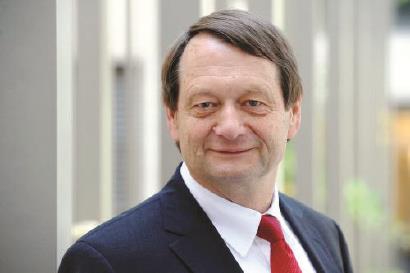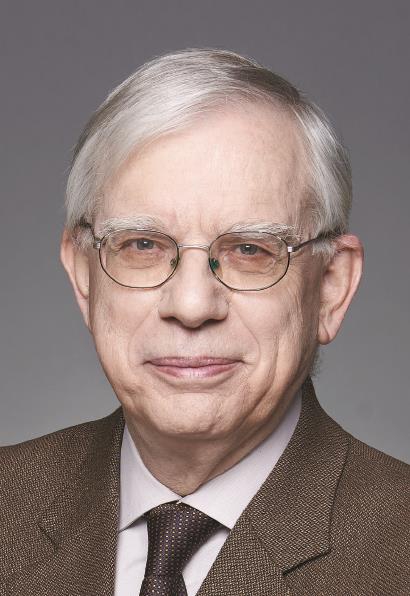2 foreign experts in Shanghai join prestigious China academy

A view of Shanghai. [Photo by Xu Wanglin/provided to chinadaily.com.cn]
The Chinese Academy of Engineering recently welcomed 20 new foreign members, two of whom are from Tongji University in Shanghai.
The two new academicians are German artificial intelligence (AI) scientist Otto Heinrich Herzog and Greek civil engineering scholar Dimitri E. Beskos. Academician is the highest academic title in China for science workers.
The two foreign academicians' stories with China can be traced back to the 1980s and 1990s. They both have a long and close relationship to Tongji University, Shanghai, as well as China, adding that they are fascinated by the academic atmosphere, open environment, and the progressive spirit of the city.
Making Shanghai a smarter city

Otto Heinrich Herzog. [Photo/dzb.whb.cn]
With his trademark gentle smile, Herzog is affectionately known as "He Zuo Ge" or "Co-operative Brother" by colleagues at Tongji University.
Prior to coming to China, Herzog built his reputation as a pioneer in the field of AI. A member of the German National Academy of Science and Engineering, Herzog was once named one of the top 10 most influential people in the history of AI in Germany due to his pioneering work and leadership in the field.
Since 1993, when he began training Chinese students in Germany, Herzog has been promoting in-depth exchanges and cooperation between China and Germany in the fields of science and technology, especially AI.
In 2014, he began to work at Tongji University, where he co-sponsored and organized the "China-Germany Future Cities Alliance" series of events, as well as placed the organizational headquarters in Shanghai.
Before coming to Shanghai, the renowned AI expert had never tried to apply AI to urban planning and urban operations. As the chief scientist of the Center for Collaborative Innovation of Intelligent Planning in the Yangtze River Delta City Group of Tongji University, Herzog has made important contributions to the interdisciplinary innovation of AI and urban planning at Tongji University.
Since joining Tongji, Herzog has set up "The Frontier of Smart City Planning" course, tutored more than 50 graduate and doctoral students, as well as strongly promoted the integration of AI with urban and rural planning, making important contributions to the innovation, as well as development of the urban and rural planning major in China.
Herzog has also been appointed to the Shanghai AI Strategy Expert Advisory Board for two consecutive terms.
During his tenure, he has submitted several reports on the development and reform of AI in Shanghai, making outstanding contributions to building Shanghai as a global AI hub, enhancing China's international influence in the AI field, as well as supporting the regional planning and governance of an AI-empowered area.
During last year's COVID-19 pandemic, Herzog was one of the first foreign experts invited to return to China. He worked on large-scale data mining related to COVID-19 prevention and control during the quarantine period in Shanghai, providing strong scientific support for China to focus its COVID-19 prevention measures on the community level.
In September, the Shanghai municipal government awarded him the Shanghai Magnolia Award for his contribution to Shanghai's development and international cooperation.
He was also appointed Honorary Professor of Tongji University earlier this year in July.
"To work at Tongji University, in Shanghai, and in China has been a whole new and enjoyable experience for me," Herzog said. "The work at Tongji University is so interesting. We have carried out a lot of projects and achieved fruitful results. In the future, I will do my best to contribute to better urban construction, AI development in China, as well as AI-empowered urban planning and governance."
Having lived in Shanghai for nearly seven years, Herzog said that he really likes the city, which always embraces new technologies and keeps making progress, adding that hopes to stay long-term. He has recently brought his wife to Shanghai and is applying for permanent residency in China.
Forging international relationships at Tongji University

Dimitri E. Beskos. [Photo/dzb.whb.cn]
At Tongji University's School of Civil Engineering, it is common to see a foreign professor in his 70s engaging in a lively academic exchange with teachers and students.
Very popular among students, there is never an empty seat at Beskos' presentations, with people often trying to find space at the back of the classroom and even in the hallways to hear him speak.
His generosity is renowned at the school, with students praising Beskos for his guidance on their papers, which he always reviews and revises with them word by word.
Beskos has long been committed to the research and teaching of computational mechanics. He is an internationally-renowned scholar in structural dynamics and a pioneer in the boundary element method.
As early as 1980, while teaching at the University of Minnesota in the United States, he began to receive advanced visiting scholars sent by China for further studies. He has mentored several graduate students and visiting scholars from China.
In the early 1990s, Beskos actively assisted and accepted young teachers from Tongji University to participate in the project research of the second framework agreement on Science and Technology Cooperation between China and the European Community.
Since September 2016, he has been employed as a Professor of Peak Discipline at Tongji University's School of Civil Engineering.
At the school, Beskos has been a proponent for international exchanges and cooperation. He has not only invited internationally-renowned scholars, editors-in-chief, and editorial board members of important academic journals to Tongji University for discussions and exchanges, but he has also recommended Chinese scholars to serve as editorial board members in important international academic journals where he was editor-in-chief, thus enhancing international awareness of Chinese scholars in related fields. Eight scholars from five Chinese universities, half of whom are from Tongji University, make up nearly a fifth of the editorial board.
In addition, Beskos hosted a delegation from the Chinese Academy of Sciences visiting Greece as a key member of the delegation of the Academy of Athens and convener in engineering in early 2019. The visit led to the signing of a new memorandum of understanding on scientific and technological cooperation between the Chinese and Greek academies.
The addition of Beskos and Herzog to Tongji University helped bolster the development of their disciplines at Tongji University and bring benefits to teachers and students at the university.

 Print
Print Mail
Mail




